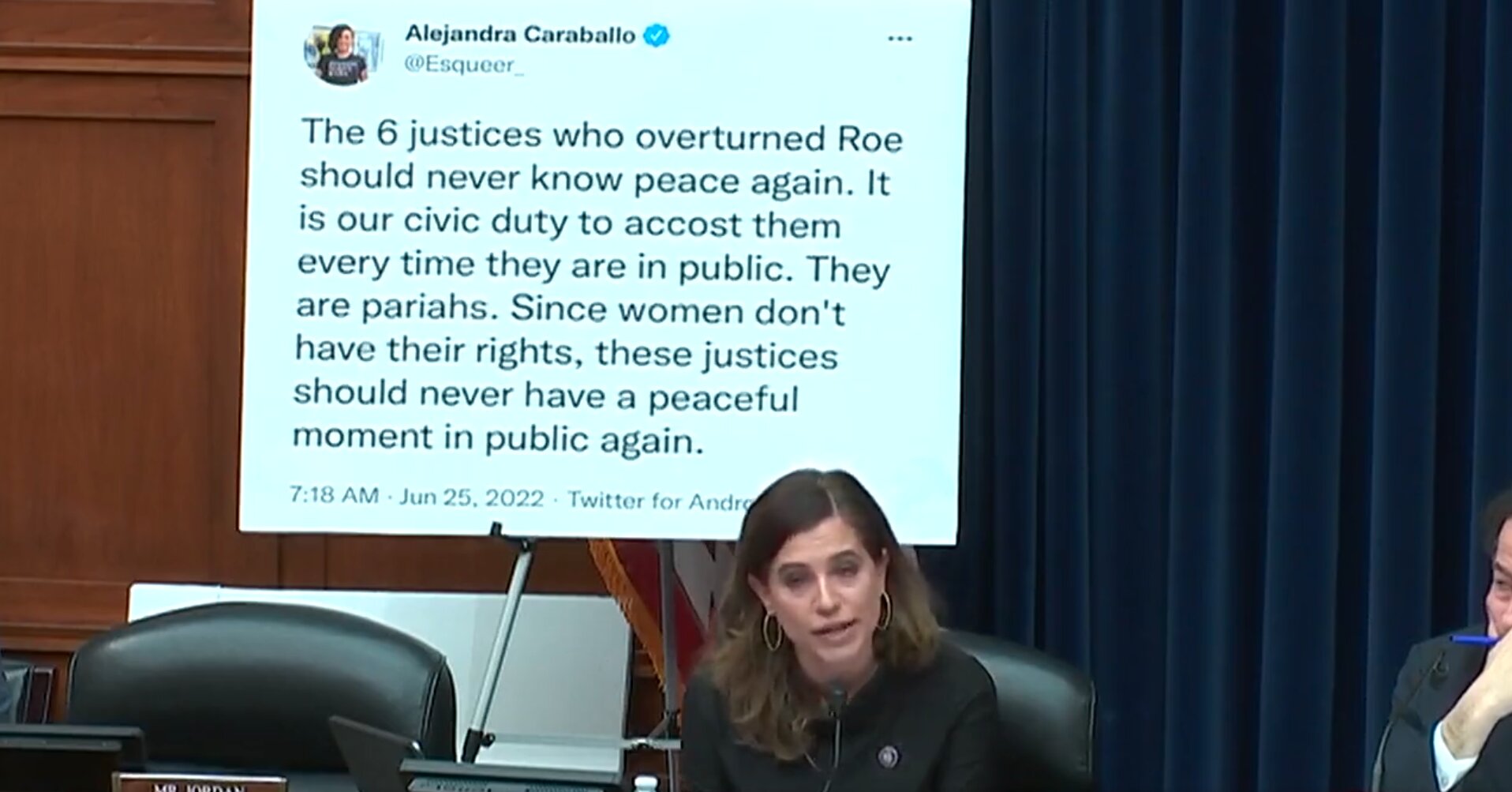In recent years, there has been a focus on right-wing rhetoric and concerns it could correlate to an escalation of threats and violence.
After House Speaker Nancy Pelosi’s (D-Calif.) husband was attacked in their San Francisco home, there were articles linking Republicans’ attacks on the top House Democrat to the incident.
During a House hearing on extremist rhetoric, Rep. Nancy Mace (R-S.C.) confronted one witness about their rhetoric about the Supreme Court on social media.
She kicked off the exchange by asking the witnesses if rhetoric on social media is a threat to democracy, and if rhetoric targeting officials for carrying out their Constitutional duties is a threat to democracy.
When all of the witnesses responded in the affirmative, Mace highlighted a tweet from one of the witnesses.
She read a tweet from transgender activist Alejandra Caraballo from after the Supreme Court decision overturning Roe v. Wade and the attempted murder of Supreme Court Justice Brett Kavanaugh.
“The 6 justices who overturned Roe should never know peace again. It is our civic duty to accost them every time they are in public. They are pariahs. Since women don’t have their rights, these justices should never have a peaceful moment in public again,” the tweet stated.
Mace then shared she carries a gun “everywhere I go” and she “fervently” blames rhetoric for a moment when she was accosted because “I know rhetoric has consequences.”
Finally, the South Carolina Congresswoman asked if Caraballo stands by the tweet and believes it is a threat to democracy.
“I don’t believe that’s a correct characterization of my statements,” Caraballo responded.
Mace shot back, “But you tweeted that. Did you not tweet that? That you thought that the Supreme Court justices should be accosted. Did you tweet that yes or no?”
“What I’m saying is that’s not an accurate characterization of my statements,” Caraballo reiterated.
Watch the video below:
At the @OversightDems hearing on white supremacy, Rep. @NancyMace asked witnesses if extremist rhetoric on social media is a threat to democracy. Trans activist Alejandra Caraballo @Esqueer_ said, "Yes." The congresswoman then presented Caraballo's tweets. https://t.co/z5VG89Kf0w pic.twitter.com/OnAEsAOIgb
— Andy Ngo (@MrAndyNgo) December 13, 2022
The video has over 2 million views on Twitter as of Wednesday morning. And it might seem like a great “owning the libs” moment.
But it perpetuates the notion that rhetoric, not explicitly condoning or urging violence, is responsible for violence and is a threat to democracy.
Caraballo’s tweet did not call for anyone to try to kill a Supreme Court justice, nor did it call for protesters to harass them at their homes. Is it a poor decision to call for people to accost Supreme Court justices in public so they can never have a “peaceful moment” again? Yes. But is it rhetoric that in itself is a threat to democracy? No.
Politicians and commentators use potent, flashy language to get attention. And the word accost does not mean to get violent or try to murder someone. If Caraballo had tweeted a call for Supreme Court justices to be murdered, then the message would be dangerous rhetoric.
Unfortunately, we’ve seen a double standard where Democratic politicians and liberals can urge people to confront conservatives and it is fine.
But God forbid Twitter owner Elon Musk tweets out, “My pronouns are prosecute/Fauci.” Then, apparently, he is promoting hate toward the “at-risk-of-violence members” of the LGBT community. It was not clear how he was promoting hate, but the accusation seems to stem from his decision to mention pronouns when not talking about his gender identity.
This is not to say there are no calls to violence on social media. But lawmakers and those in charge of social media companies should not make people fret over whether they will be labeled a threat to democracy because some lunatics might misinterpret what they were saying and engage in violence.

























 Continue with Google
Continue with Google